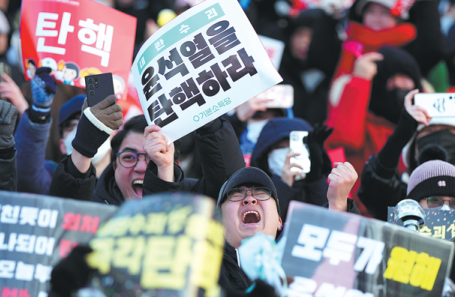Yoon impeached, but final court decision to take days

The parliament of the Republic of Korea impeached President Yoon Suk-yeol on Saturday over his shocking and short-lived martial law decree, sparking jubilation among supporters of the action, but the decision now needs endorsement from the country's Constitutional Court, which analysts said indicates that political uncertainty in the ROK is far from over.
The 300-member National Assembly passed the impeachment motion 204-85 in the afternoon, following which Yoon's presidential powers and duties were suspended, and Prime Minister Han Duck-soo took over as acting president pending a final decision from court.
Lam Peng Er, head of the Korea Centre and principal research fellow of the East Asian Institute at the National University of Singapore, called the parliament's decision "just the end of the beginning" of the political crisis in the ROK.
The Constitutional Court has up to 180 days to determine whether to dismiss Yoon as president or restore his powers. If Yoon is finally removed from office, a national election to choose his successor must be held within 60 days.
Lam said that while the court's decision will involve a complicated process, a potential fresh election will see intensified competition between the ruling and opposition parties, with factional politics adding to political uncertainty.
Saturday's secret ballot voting on Yoon's impeachment was the second held in the National Assembly within two weeks of his Dec 3 imposition of martial law. Ruling party lawmakers boycotted the first vote on the motion on Dec 7.
With all 300 members present this time, 204 voted in favor and 85 against. There were three abstentions and eight invalid votes. National Assembly Speaker Woo Won-shik said the outcome was driven by "the people's ardent desire for democracy, courage and dedication", The Associated Press reported.
Prime Minister Han, a seasoned politician who has previously held a string of top government posts, was quoted by Yonhap News Agency as saying, "I will give all my strength and effort to stably manage state affairs in this difficult time."
Han convened a National Security Council meeting and vowed to maintain a strong security posture and manage international credibility in a stable manner.
Kweon Seong-dong, floor leader of ROK's ruling People Power Party, of which Yoon is a member, said on Sunday that they have rejected a proposal by the main opposition Democratic Party to set up a bipartisan consultation mechanism to stabilize the operation of state affairs, Xinhua News Agency reported.
Lee Jae-myung, leader of the Democratic Party, told reporters on the same day that his party will not consider an impeachment move against Han as of now.
Yoon is the third ROK president impeached while in office. In December 2016, the National Assembly impeached Park Geun-hye, the country's first female president, over a corruption scandal. The Constitutional Court took 91 days to uphold her impeachment and removed her from office in March 2017. In 2004, then president Roh Moo-hyun was impeached by the ROK parliament over an alleged election law violation, but the court later overturned his impeachment and restored his presidential powers. The court's decision came in 63 days.
According to ROK laws, an impeachment case in the Constitutional Court needs to be reviewed by seven of the nine justices, with at least six voting in favor. However, the court currently has six justices after three reached the end of their term earlier this year.
Cho Hee-kyoung, a law professor at Hongik University in Seoul, said the court is likely to uphold the impeachment, as it is clear that Yoon's imposition of martial law was unconstitutional. "Basically, the court only needs to be convinced that the order came from Yoon, and he knew what he was doing," she said.
Cho noted that nomination of new justices is in progress, with two candidates recommended by the main opposition party and one by the ruling party, but their final appointment could take time, because it calls for a consensus between the two parties.
David Tizzard, assistant professor of Korean studies at Seoul Women's University, said he expects to see a huge back-and-forth battle between the parties in terms of investigation and prosecution.
kelly@chinadailyapac.com






















